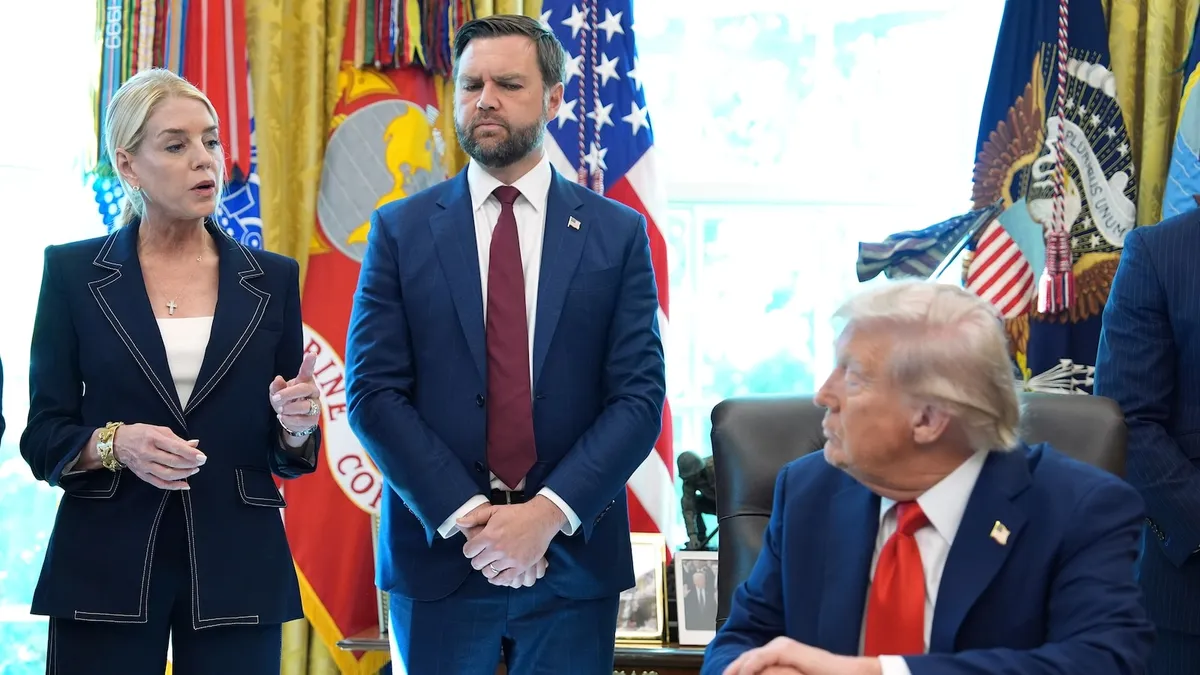
On Monday, President Trump signed an executive order that directs the Justice Department to prioritize the prosecution of Americans engaging in acts of American flag desecration. This decision comes despite the U.S. Supreme Court's previous ruling that such acts are protected under the First Amendment. To navigate around this constitutional barrier, the order acknowledges the existing legal framework while instructing government attorneys to aggressively charge individuals who burn flags with other related crimes, including destruction of property, disorderly conduct, and violations of local open burning restrictions.
The presidential order emphasizes that the American flag is the most sacred and cherished symbol of the United States. It describes the public destruction of the flag—whether by burning or other means—as uniquely offensive and provocative, potentially inciting violence and riots. The document states that the Supreme Court has never ruled that desecration of the flag, particularly when likely to incite imminent lawless action, is constitutionally protected.
Despite the strong rhetoric, neither President Trump nor the text of the executive order provides specific examples of recent flag burnings that have incited violence, nor does it present evidence that such acts pose a significant risk. Nationwide data on the frequency of flag burnings is scarce, and these incidents are generally considered rare. The landmark Supreme Court decision in Texas v. Johnson (1989) established that the government cannot criminalize the destruction of an American flag when done as a form of expression, dismissing the arguments about incitement that have been revived by Trump.
In the majority opinion, Justice William Brennan wrote that flag burning does not fall under the category of 'fighting words' that provoke retaliation and disturb the peace. He asserted that the average person would not interpret Johnson's act of flag burning as a personal insult or an invitation to violence. Brennan highlighted that a fundamental principle of the First Amendment is that the government cannot prohibit the expression of an idea simply because it is deemed offensive or disagreeable.
Justice Antonin Scalia, a conservative figure, stood with Brennan in this landmark decision, which overturned laws in 48 states prohibiting flag burning. The case originated when Gregory Johnson, the plaintiff, was convicted under a Texas law for flag desecration while protesting during the 1984 Republican National Convention. His protest did not result in any injury or violence.
Trump's recent actions indicate a desire for the Supreme Court to revisit the scope of its ruling on flag desecration, pledging to pursue litigation that clarifies the First Amendment's exceptions in this context. Last year, the Trump Justice Department prosecuted a man in North Carolina for burning an American flag during a protest, resulting in a conviction for destruction of federal property. Michael Snow Jr. was sentenced to community service and a fine, further illustrating the administration's commitment to prosecuting flag desecration.
Legal scholars and civil liberties experts express concerns that prosecutions under Trump's executive order may face significant legal challenges. While individuals can be prosecuted for burning items in restricted areas, they cannot be prosecuted for engaging in protected expressive activity, even if many—including the president—find it offensive. Bob Corn-Revere, chief counsel at the Foundation for Individual Rights and Expression, emphasized the importance of free speech, stating, “You don’t have to like flag burning. You can condemn it, debate it, or hoist your own flag even higher.”
Justice Scalia, who played a crucial role in the Texas v. Johnson ruling, later defended the precedent, reiterating the clear text of the Constitution. He expressed personal disdain for flag burning yet acknowledged that legal constraints must be adhered to. Attorney General Bondi assured that the administration would uphold free speech in their enforcement efforts, stating, “We’ll do that without running afoul of the First Amendment.”